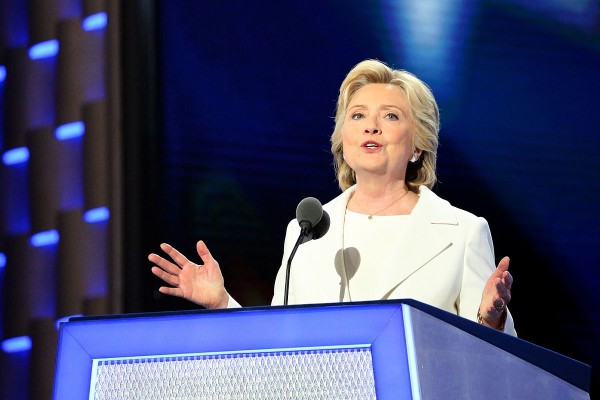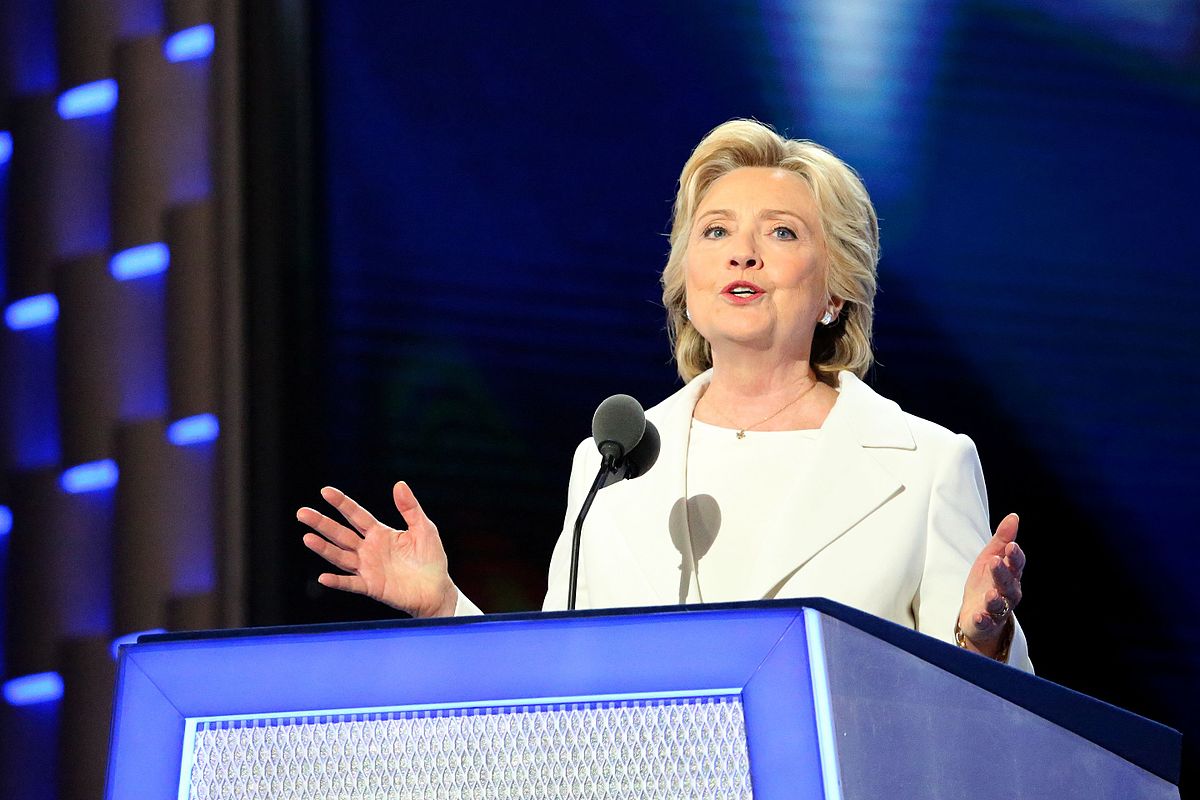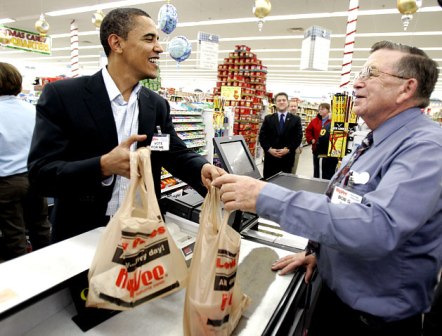
Hillary Clinton’s acceptance speech on Thursday brought to mind the wide gap that separates those in this country who want sweeping change and those who favor incremental reform. It’s played out during the presidential campaign, obviously, in the fierce primary clashes between Bernie Sanders and Clinton, and between Donald Trump and his Republican rivals. But it’s also a tension that can be seen in Clinton’s own politics.
Today, Clinton is the centrist foil to Sanders’s bold and radical idealism. She has explicitly described herself that way. “You know, I get accused of being kind of moderate and center,” Clinton told supporters last September. “I plead guilty.”
It’s easy to make the case Clinton has never really been a liberal, much less a progressive. As she noted in her autobiography, she was once a “Goldwater girl.” Raised in a conservative household, she volunteered for the campaign of Republican presidential candidate Barry Goldwater in 1964 (whose archconservatism later inspired the Reagan Revolution). In her first year of college, she served as the president of the Wellesley Young Republicans.
By then, however, she was supporting moderates—Rockefeller Republicans like John Lindsay, the mayor of New York, and Edward Brooke, a Massachusetts Republican and the first African American US senator. Her politics shifted further, as it did for many young people, as the Vietnam War and the civil rights movement made her question the policies and norms of the day. In his biography of Clinton, Carl Bernstein quotes a letter from around this time in which Clinton described herself as “a mind conservative and a heart liberal.”
Her first major speech—one that unexpectedly made headlines—was the address she gave at her Wellesley College graduation in 1969, the first year that Wellesley featured a student speaker at its commencement. Clinton went up on stage following the commencement speaker—who that year was Senator Brooke. In her speech, a young Clinton mingles her characteristic pragmatism with an uncharacteristic idealism—a bold demand for transformative change.
Brooke had criticized the disruptive protests of the day as “unnecessary” and “ineffective.” “Potential allies are more often alienated than enlisted by such activities, and their empathy for the professed goals of the protesters is destroyed by their outrage at the procedures employed,” he said. Brooke then highlighted the “measurable progress” of recent years, including the drop in the poverty rate over the past decade. Change within the system works, he concluded.
In impromptu remarks at the beginning of her speech—words that incensed university officials—Clinton chided the senator:
Part of the problem with just empathy with professed goals is that empathy doesn’t do us anything. We’ve had lots of empathy; we’ve had lots of sympathy, but we feel that for too long our leaders have viewed politics as the art of the possible. And the challenge now is to practice politics as the art of making what appears to be impossible possible. What does it mean to hear that 13.3 percent of the people in this country are below the poverty line? That’s a percentage. We’re not interested in social reconstruction; it’s human reconstruction. How can we talk about percentages and trends? The complexities are not lost in our analyses, but perhaps they’re just put into what we consider a more human and eventually a more progressive perspective.
A practitioner of the “art of the possible”—that seems to describe perfectly Hillary Clinton’s reformist politics of recent years. And yet five decades ago, she was talking—eloquently and off the cuff—about a more profound kind of change.
Glimpses of that younger, idealistic Clinton came out in her husband’s remarks on Tuesday, as he described her legal work on behalf of children and the poor. But even after Bill Clinton was elected president, Hillary Clinton could still sound at times like the socialist Vermont senator she’d face decades later in the primaries. When White House advisers critical of her single-payer health care plan called it unfriendly to business, she bluntly told her husband, “You didn’t get elected to do Wall Street economics.”
How much things have changed for Clinton: from a First Lady berating her husband for doing Wall Street’s bidding, to a presidential candidate being berated for doing Wall Street’s bidding. By the time of her 2000 Senate campaign, Clinton was projecting an image of being anything but business-unfriendly—one that she further cemented by developing, as New York’s junior senator, close ties to the financial sector. In terms of policy, she advocated piecemeal reforms. “I now come from the school of small steps,” she said.
Her critics might call this shift a sign of her inveterate duplicity—her willingness to do anything to get elected. More charitably, you could call it a symptom of a political post-traumatic stress disorder. It’s clear that she was chastened by the catastrophic failure of health care reform. She was humbled, too, by the disastrous 1994 midterm election that swept Republicans into power.
But in her acceptance speech on Thursday, Clinton seemed to be trying to bridge the gap between her younger and older selves. She spoke of “big ideas.” She spoke of “understanding.” She spoke of “healing.”
I refuse to believe we can’t find common ground here. We have to heal the divides in our country. Not just on guns. But on race. Immigration. And more. That starts with listening to each other. Hearing each other. Trying, as best we can, to walk in each other’s shoes.
It was the sort of touchy-feely rhetoric that might have come from the lips of George McGovern, the unabashedly liberal Democratic senator whom she and Bill Clinton campaigned for after college.
Of course, even as she appealed to ideals rather than policies, Clinton turned to what her campaign calls the central motif of her career: action. As in her 1969 commencement speech—when she made the brash statement that “empathy doesn’t do us anything”—she stressed the long and hard struggle for political change. But also like in that earlier speech, she made a conscious effort to balance that pragmatism with idealism—in her words, “action” with “understanding.”
I went to work for the Children’s Defense Fund, going door-to-door in New Bedford, Massachusetts on behalf of children with disabilities who were denied the chance to go to school. I remember meeting a young girl in a wheelchair on the small back porch of her house. She told me how badly she wanted to go to school—it just didn’t seem possible. And I couldn’t stop thinking of my mother and what she went through as a child. It became clear to me that simply caring is not enough. To drive real progress, you have to change both hearts and laws. You need both understanding and action. So we gathered facts. We built a coalition. And our work helped convince Congress to ensure access to education for all students with disabilities.
It’s a big idea, isn’t it? Every kid with a disability has the right to go to school. But how do you make an idea like that real? You do it step-by-step, year-by-year … sometimes even door-by-door.
Clinton has been described—and has described herself—as a “work horse, not a show horse.” In Thursday’s speech, she could have said more more about her background and experiences to soften her hard-nosed public image and connect with voters. After all these years in the political spotlight, she still comes across as (at least relative to most politicians) a private person, one who is uncomfortable with making a personal connection from far across a stage. As she noted, “The truth is, through all these years of public service, the ‘service’ part has always come easier to me than the ‘public’ part.”
Luckily for her, many Americans can, in theory, relate to that kind of personality type—because it describes who they are, too. Clinton hasn’t done enough to relate to voters in this way, but her speech on Thursday was a step in that direction, stressing to them her indefatigable determination—an oft-ignored, almost folksy trait in a political system increasingly fueled by Hollywood-style celebrity and telegenic charisma.
But I’m here to tell you tonight—progress is possible. I know because I’ve seen it in the lives of people across America who get knocked down and get right back up. And I know it from my own life. More than a few times, I’ve had to pick myself up and get back in the game. Like so much else, I got this from my mother. She never let me back down from any challenge. When I tried to hide from a neighborhood bully, she literally blocked the door. “Go back out there,” she said. And she was right. You have to stand up to bullies. You have to keep working to make things better, even when the odds are long and the opposition is fierce.
Bill Clinton is a master of the politics of personal connection; Obama, a master of the politics of inspiration. Those traits matter mightily for any president, who must often rely on charm offensives and the bully pulpit to advance policy. Obama once implied that his hope was to “change the trajectory of America” and put the nation on a “fundamentally different path,” in the ways that his predecessors Reagan and Kennedy did. How would he do that? Through persuasion as much as policy—by tapping into the culture of the moment as much as altering the structure of law.
If Hillary Clinton wins the presidency, we’ll learn whether a modern president of a quite different temperament can also succeed in this task. Her strength—as she admitted half-jokingly on stage—is in the unglamorous work of rolling policy boulders up political hills.
And yet her speech also reminds us that there is still something of that young college grad in Hillary Clinton. There’s still a belief in big ideas—a boldness that the Sanders campaign, among other things, has helped stir in her again. There’s still an ambition for something more than small steps—for a politics of the impossible. If she can rekindle that part of her, she may put this country on a fundamentally different path.
Victor Tan Chen Victor Tan Chen is In The Fray's editor in chief and the author of Cut Loose: Jobless and Hopeless in an Unfair Economy. Site: victortanchen.com | Facebook | Twitter: @victortanchen
- Follow us on Twitter: @inthefray
- Comment on stories or like us on Facebook
- Subscribe to our free email newsletter
- Send us your writing, photography, or artwork
- Republish our Creative Commons-licensed content





